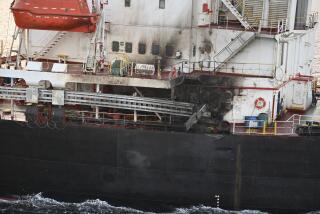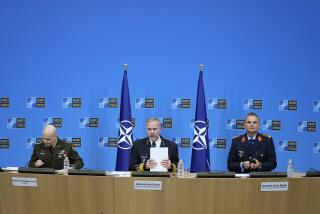West Plans Searches, Force if Needed, in Yugoslav Blockade
- Share via
WASHINGTON — The major Western powers charged with enforcing a new U.N.-ordered naval blockade of Serbia and Montenegro plan to board and search suspicious vessels--and fire shots if necessary--to prevent them from delivering cargo to the rump Yugoslavia, officials said Tuesday.
Details are expected to be mapped out today and Thursday at a meeting of the North Atlantic Treaty Organization and by the nine-country Western European Union, the military arm of the European Community, whose ministers will meet Thursday in Rome.
The action, which seems likely to constitute the most sweeping international naval blockade since the U.S.-led allied coalition cut off Iraq during the Persian Gulf War, will be conducted primarily on the Adriatic Sea, officials said.
The allies also plan to ask three former Soviet Bloc countries along the Danube River--Romania, Bulgaria and Hungary--to help enforce the embargo there. Because the Danube passes so many countries, it is regarded as international waters.
It was not immediately clear precisely what part the United States will play in carrying out the U.N. blockade order, approved late Monday in a 13-0 vote of the 15-member Security Council. There were two abstentions. The order authorizes the allies to block shipments of most energy products and key industrial commodities into Serbia and Montenegro, and to use force, if necessary, to ensure that the blockade is respected.
Trade sanctions were imposed against Serbia and Montenegro in May, but reports indicate that arms and petroleum products have been slipping through almost unimpeded.
U.S. officials said Washington will probably decide its role in the blockade after seeing what portion of the burden European countries assume. But Bush Administration officials said there is no doubt that Washington, which pressed hard for several weeks to win approval for the blockade, is serious about enforcing the order.
“We intend to see the resolution implemented,” Richard Boucher, the State Department’s spokesman, said Tuesday.
However, U.S. officials cautioned Tuesday that despite wide support for the U.N. resolution, it probably will take time for the allies to assemble the naval blockade--primarily because others are not as eager as Washington to enforce the embargo.
One senior U.S. official noted that although the United Nations has imposed a no-fly zone over Bosnia to blunt Serbian air attacks, the restrictions still have not been enforced. He predicted that assembling the blockade will be “painfully, painfully slow.”
With U.S. participation, NATO and the WEU have conducted joint naval operations in the area since July; until now, Western warships have been authorized only to “monitor” cargo traffic, not to interdict or board vessels, as the new resolution allows.
Pete Williams, the Pentagon spokesman, said the United States has one ship--the guided-missile frigate Halyburton--on station in the region. But he indicated that Washington would be willing to increase the number, if necessary, to help enforce the blockade.
Pentagon officials said the amphibious assault ship Guam and the cruiser Wainwright also are on temporary duty in the Adriatic, conducting surveillance and search-and-rescue operations for relief flights into Sarajevo.
The imposition of the blockade marks another modest escalation in the Administration’s cautious response to the Serbian-supported civil war in Bosnia-Herzegovina, which has defied less sweeping efforts to end the fighting.
Officials said the allies also were considering moves to tighten enforcement of the embargo on land--a step that presumably would entail the use of increased ground troops--but still were a long way from making any decisions on it. President Bush and Pentagon leaders such as Gen. Colin L. Powell, chairman of the Joint Chiefs of Staff, have vigorously opposed involving U.S. ground troops in the area.
Bush has been under pressure to step up U.S. efforts in the Balkans, notably from President-elect Bill Clinton, who has urged the Administration to take a more aggressive stance in the face of the Serbian “ethnic cleansing” campaign in Bosnia--the practice of forcibly ousting non-Serbs from Serb-controlled areas.
Williams said Tuesday that the Administration had not attempted to consult Clinton on enforcement of the U.N. resolution; Clinton has indicated he plans to leave such decisions to Bush until the presidency changes hands Jan. 20.
Williams insisted that Washington will not act unilaterally. “Anything that we do would probably be in an alliance context,” he said.
Times staff writer Doyle McManus in Washington contributed to this report.
Tightening the Noose
The blockade is expected to be conducted primarily in the Adriatic Sea, but also along the Danube River.
Already on the scene: NATO currently has a standing naval force of seven frigates in the Mediterranean. Three of those ships, including the U.S. guided-missile frigate Halyburton, are in the Adriatic off Yugoslavia.
More to Read
Sign up for Essential California
The most important California stories and recommendations in your inbox every morning.
You may occasionally receive promotional content from the Los Angeles Times.












